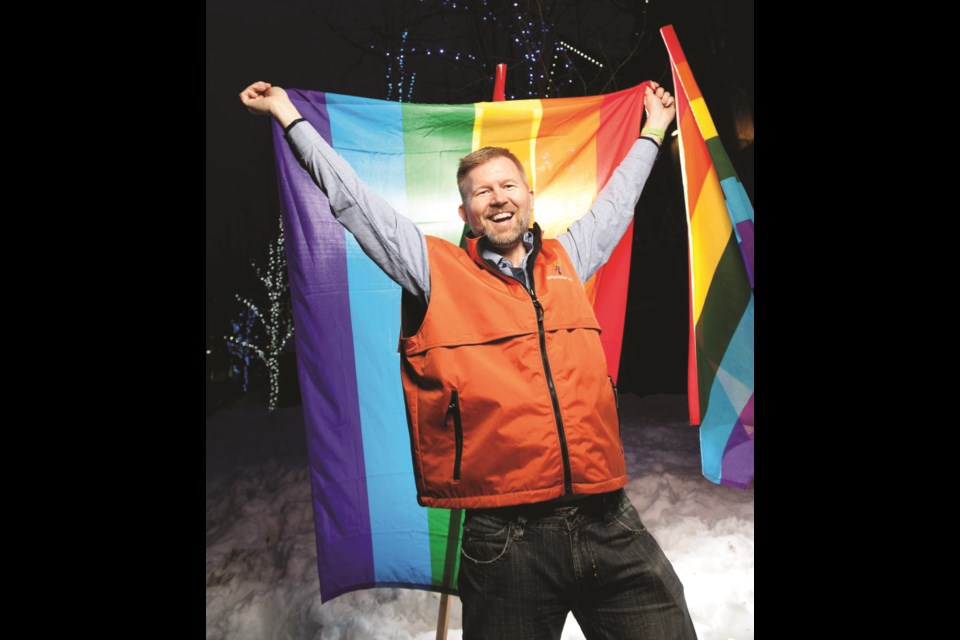When Dean Nelson attended his first Snowball in 1994, the marquee event of Whistler Pride and Ski Festival, he was expecting a ball-gown and black-tie affair, and dressed accordingly.
“I went with a couple colleagues from work and they were in these beautiful dresses and I’m in a suit, and we get in there and everyone was half-naked,” he recalled. “I was like, ‘Oh my god!’ It was kind of an eye-opener.”
For Nelson, who would later assume the role of executive director, it was the first realization of how special the festival was: a place where the LGBTQ+ community could let their hair down and be themselves, whether it was dancing the night away at the Roundhouse, skiing the alpine with rainbow-flag flying high, or simply walking down the Village Stroll, hand-in-hand with the person they love.
LGBTQ+ tourism consultant and travel curator, Nelson spoke about the history of North America’s longest-running gay ski week and the important legacy it has left behind, as part of an online talk last Wednesday, Feb. 17 hosted by the Whistler Museum.
Founded in 1992 by Brent Benaschak, the festival, then known as Altitude, was created in response to a controversial amendment to Colorado’s state constitution that prohibited cities and institutions from establishing anti-discrimination protections for sexual orientation. (Known as Amendment 2, it was eventually declared unconstitutional by the U.S. Supreme Court.)
“Basically, it gave landlords and businesses the opportunity to openly discriminate against gays and lesbians,” Nelson explained. “It was absolutely terrible.”
Instead of spending money in a state that didn’t value them as people, Benaschak and a group of friends decided to establish their own gay ski week in Whistler, considered one of the few ski resorts at the time that accepted the LGBTQ+ community.
Even still, it was not all smooth sailing in the nascent years. Still on the tail end of a devastating HIV-AIDS epidemic, “there was a lot of misinformation and misunderstanding of what the disease was all about,” Nelson said. “A lot of businesses were nervous about having so many gay people in the resort.”
That led to an initiative called the Pink Dot Campaign, which saw festival attendees mark their money and credit card receipts with a pink sticker so resort businesses would be hard-pressed to ignore the event’s economic windfall.
“That was just so the merchants could see gay money coming into the resort, and that really turned attitudes around, that there is a big impact here,” noted Nelson.
Whistler Pride was fortunate to have some notable boosters in those early years, including Beverly Brown, the GM of now-shuttered Monk’s Grill, who offered the restaurant to host the festival’s inaugural Snowball, and openly gay Mayor Ted Nebbeling.
An early watershed moment for the festival came in the mid-‘90s when the National Brotherhood of Skiers, a U.S.-based club for Black skiers that were in town at the same time as Pride, complained to the municipality about there being too many gay people in the resort. The RMOW, in turn, defended the festival, saying that everyone was welcome in the resort.
“That sent a really nice message for us, saying, ‘Hey, we’re an invisible minority, and it’s really wonderful to have an ally that is standing up for us,’” Nelson said.
Taking over the festival in 2006 when it was at risk of an 11th-hour cancellation, Nelson and his team somehow pulled off the event at the last minute—and, to their surprise, managed to break even.
That year also established a new level of visibility for the festival when organizers successfully lobbied to hang rainbow banners on the pedestrian bridge overlooking Village Gate Boulevard.
“It was quite emotional for a lot of people when they were taking in the Whistler perimeter, coming around the corner and seeing the rainbow flags,” Nelson recalled. “That was the first time in the event’s history that we were really out and proud and really visible. … The attitude and the energy in the village shifted knowing that it was Pride Week. It was pretty special.”
That visibility expanded in 2010, Whistler’s Olympic year, with the resort’s first gay pride parade, sandwiched between the Olympics and Paralympics, as well as the establishment of Pride House, a safe space for LGBTQ+ athletes and media that was the first of its kind for the Games.
“We thought by creating Pride House, we could create the conversation. We knew that if there was enough awareness of homophobia within sport, then we could start advocating at senior levels within sport to start making their sporting environments safer for their athletes,” Nelson said.
“This is the legacy we gifted to the world, and it continues to this day. It’s pretty remarkable.”
This month would have marked Whistler Pride and Ski Festival’s 29th year, but of course, the pandemic forced organizers to postpone the event. But even without an in-person event, Nelson knows the festival’s significance runs deeper than just a week on the calendar.
“Pride is more than just an event now,” he said. “It’s an attitude, it’s a spirit of the community, and it’s a core value.”
For more information, visit whistlerpride.com.





